25+ Sample Employee Non-Compete Agreements
-
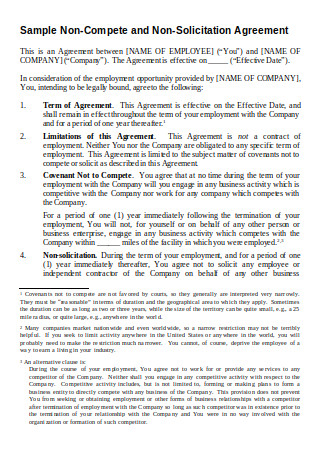
Sample Non-Compete and Non-Solicitation Agreement
-
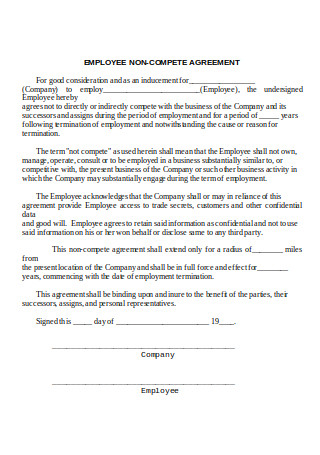
Employee Non-Compete Agreement
-
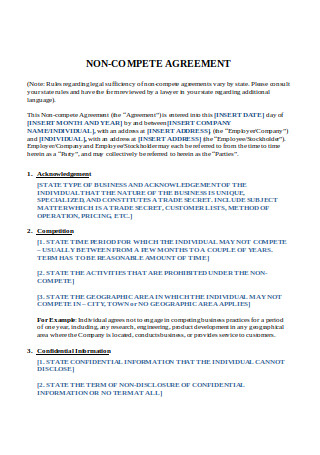
Non-Compete Agreement Template
-
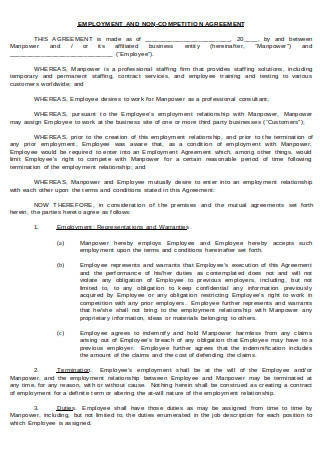
Employment and Non-Competition Agreement
-
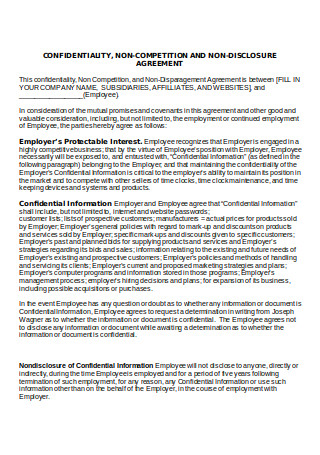
Non-Competition and Non-Disclosure Agreement
-
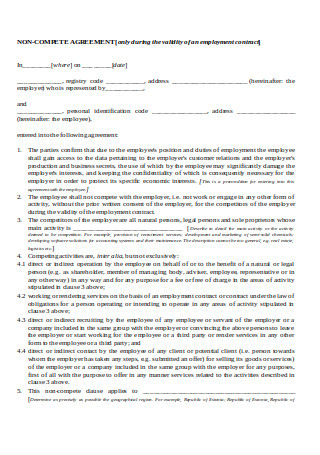
Non-Competition Agreement
-
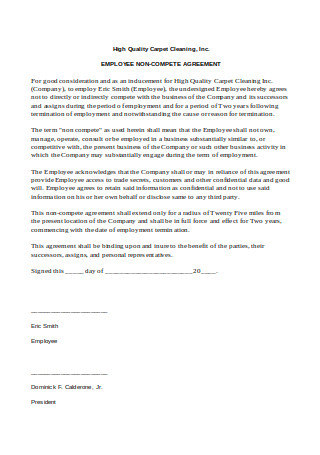
Sample Employee Non-Compete Agreement
-
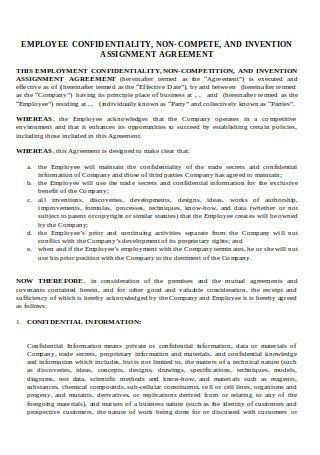
Employee Non-Disclosure and Non-Compete Agreement
-
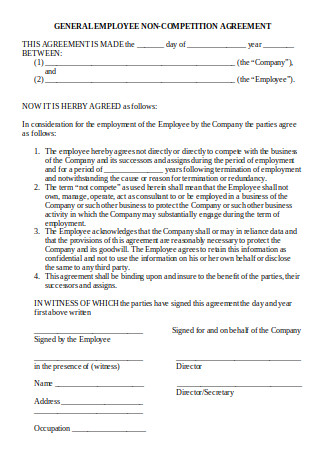
General Employee Non-Competition Agreement
-
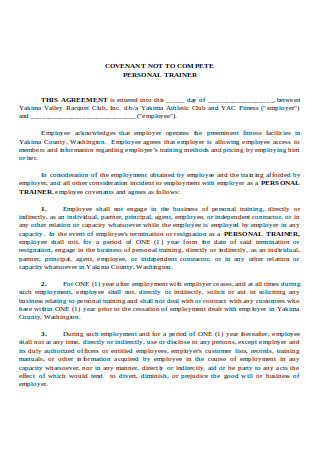
Non-Competition Agreement Sample
-
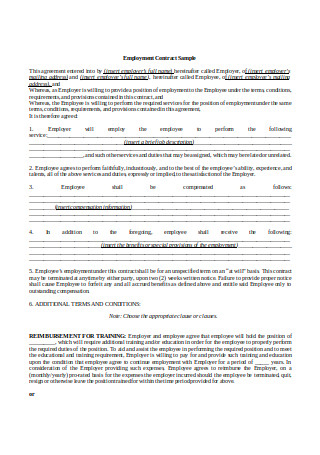
Small Business and Pre-Employment Agreement
-
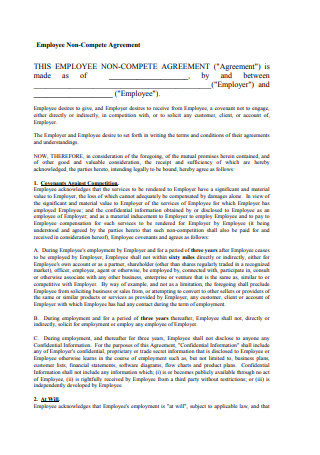
Employee Non-Compete Agreement Blank Form
-
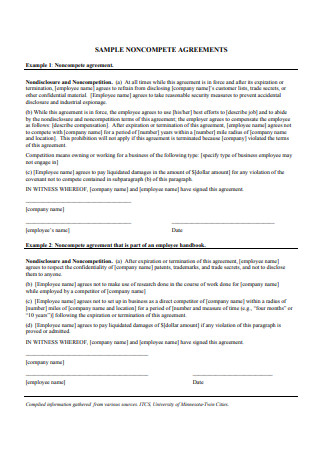
Sample Non-Compete Agreement
-
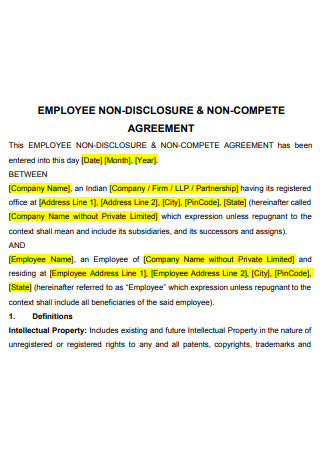
Printable Employee Non-Disclosure & Non-Compete Agreement
-
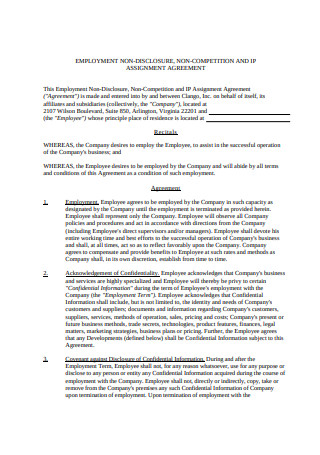
Simple Non-Compete Agreement
-
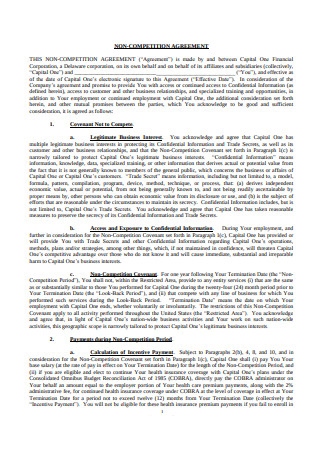
Standard Non-Compete Agreement
-
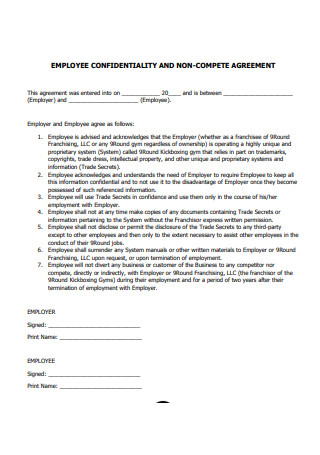
Employee Confidentiality and Non-Compete Agreement
-
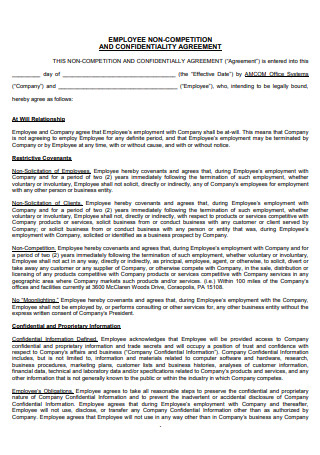
Employee Non-Competition & Confidentiality Agreement
-
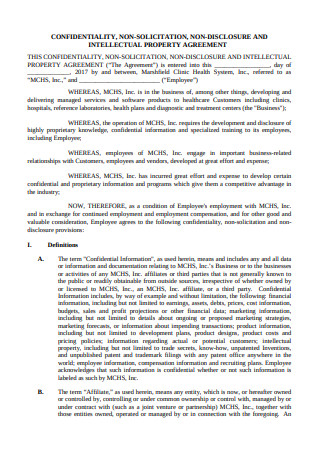
Non Solicitation Agreement Sample
-

Non-Disclosure Agreement
-
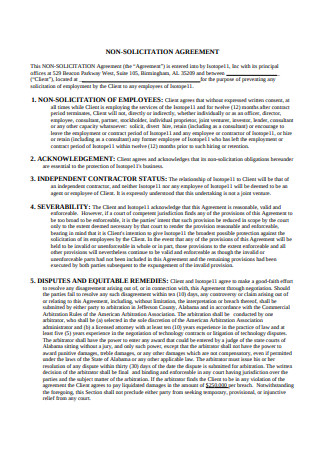
Simple Non-Solicitation Agreement
-
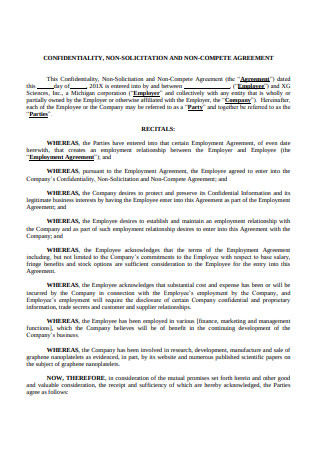
Non-Solicit Non-Compete Agreement
-
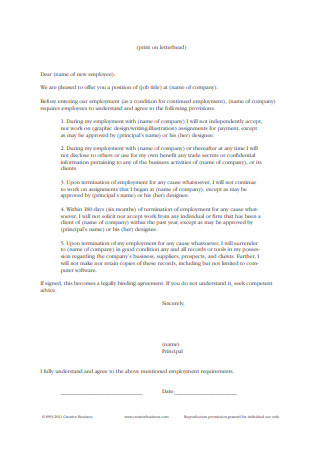
Non-Compete Agreement Form
-
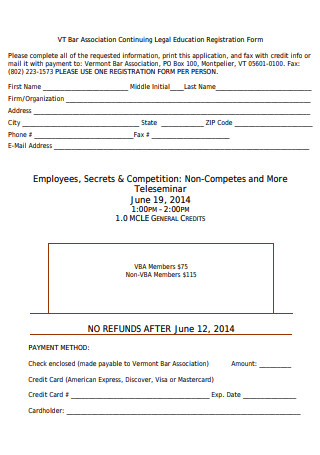
Legal Education Registration Form Sample
-
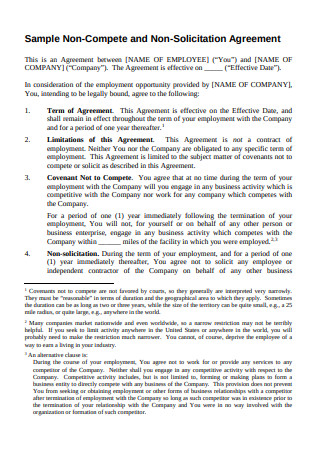
Sample Non-Compete and Non-Solicitation Agreement
-
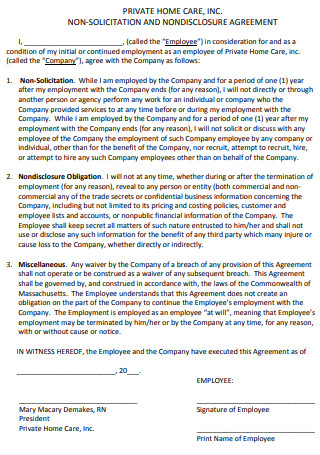
Simple Non Solicitation and Nondisclosure Agreement
What Is an Employee Non-Compete Agreement?
An employee non-compete agreement is a contract that allows an employer to control its past employees’ actions long after they leave the company to pursue other endeavors. In this legal arrangement, the employee agrees not to engage in any activity or trade that could harm or compete with the other party’s business operations. The employee is usually obligated to uphold his or her part of the agreement only to a particular geographical area and time frame. However, keep in mind that enforce ability is a matter of state policies. If the laws in your state prohibit the use of non-compete agreements in respect to one’s rights and freedom of trade and work, you’ll have to settle with a different arrangement that adheres to your state laws. It’s always best to learn more about the reasonable restrictions set by local policies before you begin drafting your employee non-compete agreement.
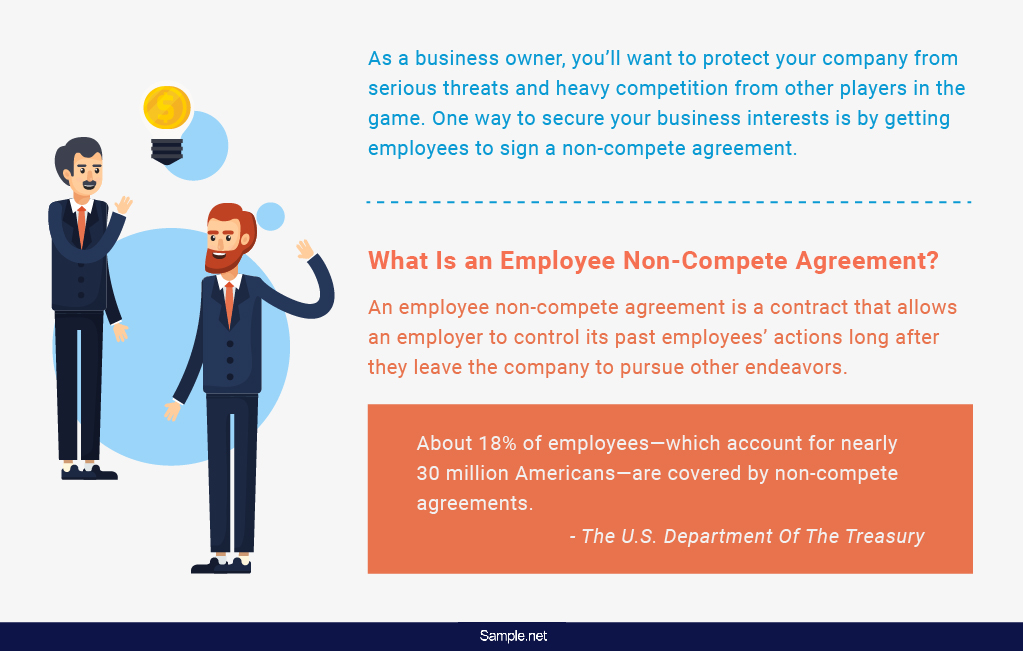
The Benefits of an Employee Non-Compete Agreement
Losing top talents in your organization can strain your operations, and losing them to a competitor makes it all the more alarming. The last thing you’d want to do is to invest much of your time and resources in an employee only to see them turn against you for personal gain. This forces many companies to function at peak efficiency in order to protect themselves from unethical business practices driven by market competitors. Fortunately, a solid employee non-compete agreement offers just that.
While non-competes are more prevalent among higher-wage workers, a 2016 survey by the Social Science Research Network shows that among 11,000 workers, almost 40% of them had signed a non-compete agreement in the past. This approach is commonly used among medium- and large-scaled businesses that hope to control the behavior of their employees. It reduces the risks of a former employee opening their own company and becoming a direct competitor through the knowledge garnered from a past employer. Many times do companies invest much of their resources to help maximize productivity within the team. As they make their way up the corporate ladder, these employees eventually gain access to most of the company’s operational data. Hence, you can only imagine how these employees could easily get the upper hand in the competitive field if they wanted to. An unfair advantage might seem unjust in your part, but it’s a gamble that competitors are more than willing to risk.
Your ability to maintain the secrecy your company’s most vital information can mean the difference between success and failure, so the best you could do is to bind the employee to secrecy using a non-compete agreement.
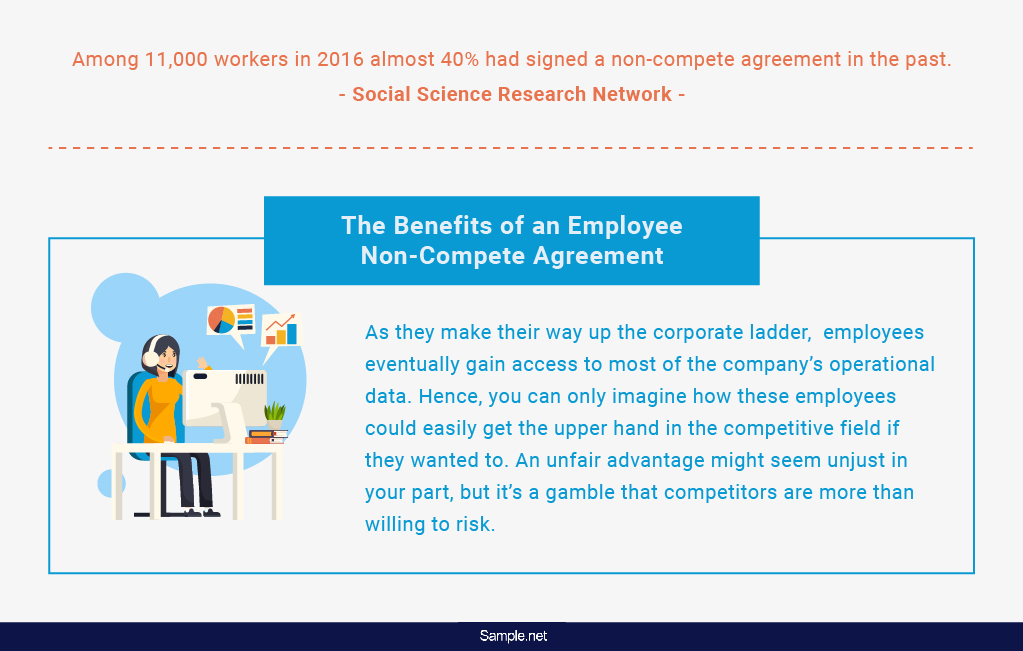
How to Draft an Employee Non-Compete Agreement
Legal agreements can be complicated to draft. There’s a lot to consider to ensure that the agreement is enforceable in the court of law. But non-compete agreements aren’t exactly the kind of documents favored by judges due to how they tend to restrict trade to an unreasonable degree. Thus, you need to make sure the clauses of your agreement are sufficient to withstand court scrutiny. Listed below is a step-by-step guide to help you produce a non-compete agreement.
Step 1: Learn about Your State Law’s Treatment of Non-Compete Agreements
Courts aren’t a big fan of non-compete clauses. If you unknowingly included a provision that only applies to the laws implemented in other states, the judge will immediately strike it off and offer you a settlement that favors the opposing party more than your own. Non-competes are illegal in many states across the U.S., so be sure to do some extensive research on the laws that are acceptable or limited in your region. It’s best to consult with a business attorney first to find out how the court may handle your case if worse comes to worst.
Step 2: List the Information that it Covers
Non-compete agreements help keep past employees from using proprietary information for a competitive gain. They generally include a provision that requires exiting employees to surrender any manuals, customer lists, or business documents to the employer before they leave. The agreement must also include the specifics regarding activities that refrain employee engagement. This includes, but is not limited to, soliciting company clients, encouraging other employees to leave, and competing with the business as a direct competitor. The agreement must define the interests you want to protect as a for-profit entity in order to ease your company’s vulnerability.
Step 3: Outline the Penalties for Violations
While taking the case to court is still necessary, you may want to include remedies to resolve violations and lessen the possibility of having your lawsuit neglected by the judge. It’s important to specify any forms of relief that are legal and equitable so that the judge may respond to the case in your favor. The judge will likely order the employee to end any activities that violate the terms of the agreement. You can also have the employee compensate for the damages caused and require the violator to pay for your court expenses. Try not to decide on anything too harsh and illogical, as it’s only ethical to present the other party with a fair trial.
Step 4: Determine How Long the Restrictions will Last
The length of time the restrictions will be in effect is one of the most crucial factors that judges consider when determining whether the non-compete is reasonable enough to enforce. Typically, a non-compete would cover a period of six months to two years. Anything longer will be examined by the judge to decide whether it’s really necessary. The ideal duration may vary from case to case, as some circumstances may require a longer restrictive period to protect the company’s most valuable assets and interests. It’s a good idea to set varying periods for different restrictions to cater to all types of circumstances. Bear in mind that in many states, judges have the authority to void clauses with unreasonably long durations, so you’re better off safe than sorry.
Step 5: Define the Restricted Geographic Areas
A non-compete agreement, regardless of the state laws that govern it, is only enforceable if it is limited to a particular geographic area. This is why it’s essential to use specific language when defining the geographic scope that the agreement covers. This largely depends on what the employee does for you and what he or she is likely to do upon leaving the company. Your clause is more likely to uphold if you make it reasonable enough for the judge to approve. For instance, courts don’t typically enforce a non-compete that restricts former employees from working with a competitor in locations where you don’t do business. It’s best to keep your geographic scope as narrow as possible to avoid issues in the near future.
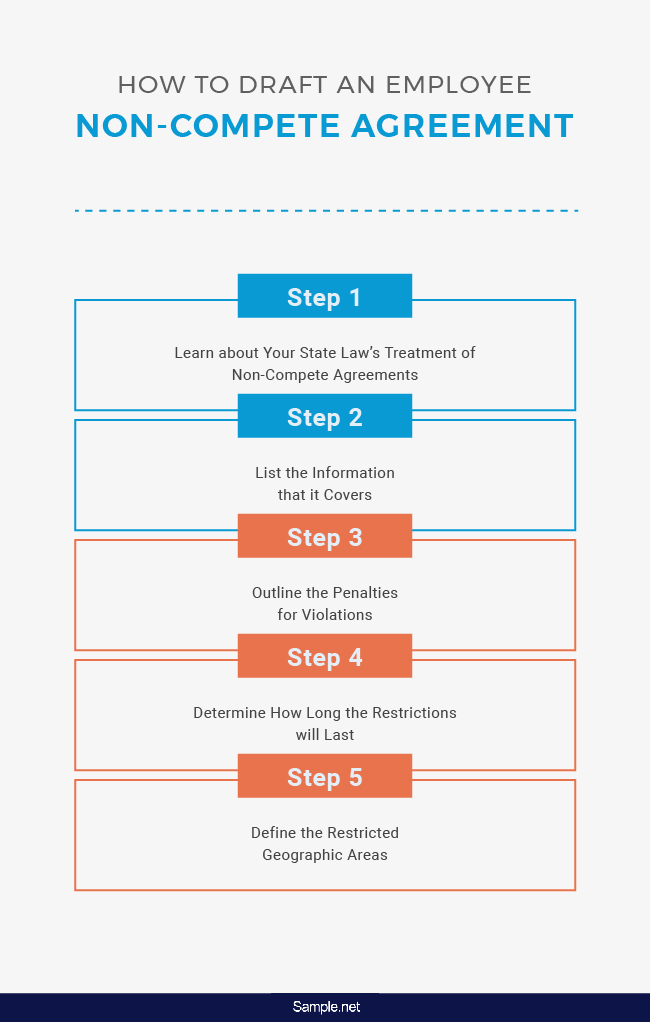
The Dos and Don’ts of an Employee Non-Compete Agreement
Non-compete agreements are a valuable tool aimed to protect an employer’s business interests against the ill intentions of a potential competitor. This reduces the likelihood of your company’s most sensitive information from being shared or used for competitive advantage. But non-compete agreements are usually tricky to enforce. The legal issues that surround the agreement make it a challenge for most companies to create. So to make it binding under lawful terms, the agreement must be done correctly.
Dos
1. Do prepare a tightly crafted document.
You can always download contract and agreement samples from the Internet to make the job easier. But that doesn’t mean you can rely on a sample or template to do all the work. The judge and the opposing counsel won’t find it hard to spot the generalities of the document that look like it was cut and pasted right off Google. Hence, it’s essential to customize the agreement per your company policies. Identify what you want to protect and make sure it accurately defines the activities that are proscribed.
2. Do use them for high-level or skillful employees.
People who have access to trade secrets and other confidential information may also pose a threat to the company. There are many reported cases of big-time employees betraying their current employers after being influenced by greed, power, and money. These cases are often settled through nasty court battles that put both parties in a stressful setting. Those who possess unique skills in their field of expertise are also a known target for leading competitors. Keep in mind that those who are smart enough to move up the corporate ladder are also clever enough to “steal” your most precious data from right under your nose.
3. Do be reasonable with the litigation.
Some states such as New York, Pennsylvania, New Jersey, and Connecticut permit the “judicial blue pencil” in which judges are allowed to strike out the offending parts of a non-compete contract or agreement to make it reasonable. Many judges believe that non-competes are merely a vindictive strategy to punish individuals and to keep other employees from leaving. As for states that do not authorize this action, judges are forced to take the “red pencil” that involves declaring the unreasonable non-compete agreement as unenforceable. To avoid these circumstances altogether, you need to be reasonable with the legal action you choose to take. A non-compete is more likely to be imposed if it is limited in time, area, and what constitutes competition.
4. Do act quickly to prove your claims.
If you have reason to believe that the employee is breaching or may begin violating his or her agreement, make sure you have gathered all the facts to support your account. Bear in mind that you cannot build your case on assumptions alone, as false accusations may cause you to lose credibility as a professional entity. Instead, it’s best to keep your lawyers in the loop of things to see where it leads you. If you can back an employee’s suspicious behavior with hard evidence, you need to move quickly. Figure out what you want to do to get relief from the case. Whether you decide to prohibit the employee from working with a competitor is solely up to what you think is best for the company’s future.
5. Do consider other solutions to the issue.
If a non-compete agreement doesn’t seem like a viable solution to you, consider using a legal confidentiality agreement or a nondisclosure agreement as alternatives. Employees that sign this agreement are not allowed to use or disclose proprietary information without the company’s consent. This applies to all employees in the organization regardless of their position or ranking in the corporate hierarchy. Non-solicitation agreements may also be helpful if you wish to prohibit your employees from contacting clients or colleagues, either directly or indirectly, in order to solicit business for their personal benefit. However, these agreements must be reviewed before they are executed to determine the entire scope that they cover.
Don’ts
1. Don’t let your emotions affect what you decide to do.
It’s easy to get carried away with your emotions and respond irrationally to the situation. Dealing with the betrayal of who you thought was a trustworthy employee can be difficult for any employer. But regardless of what they did or how much damage they have caused, you need to take the appropriate measures to resolve this issue. Revisit your non-compete agreement and see if they have committed an act that constitutes a breach of contract. Note that it is possible for the accused to win the case despite their blatant betrayal, mainly when there are loopholes in the agreement that place you at a disadvantage. If you are in the middle of drafting the agreement and taking the worst-case scenarios into account, avoid including terms and conditions that are too unrealistic to impose.
2. Don’t make the scope too broad.
You might think that broadening your scope will help protect your business from every threat imaginable, but that isn’t necessarily the case. The court may be more concerned about how employees will make a living compared to the interests of their employers. An effective non-compete agreement must be narrowly tailored to protect a legitimate business interest that is vulnerable to internal and external threats. Limiting the duration of the agreement, its geographic scope, and the activities prohibited is one way to spare your employees from the unreasonable burden brought by an unrealistic agreement.
3. Don’t use them for all your employees.
There’s no reason to have every single employee sign a non-compete agreement if the very foundation of the arrangement does not apply to their position. Not all of your employees have access to sensitive company information. Low-level employees only have little to no knowledge of any trade secrets that the company works hard to protect. It’s not just a waste of time for everyone involved, but it also restricts the actions and decisions of employees even when they decide to leave the company for good.
4. Don’t neglect the laws of the state.
Most states in the U.S. recognize and enforce non-compete agreements, while only a few states either ban these agreements completely or prohibit them in most circumstances. Be sure to check with your state laws by seeking legal counsel with an experienced attorney. This is a step of the process that must be prioritized to ensure that your agreement complies with the policies of the state that governs it.
5. Don’t be afraid to use them when applicable.
Although non-competes can be the hardest and the most expensive to enforce and win in court, there’s a good reason why the agreement exists in the first place. Not using them in cases when they are most useful can be very detrimental. As a business, you’ll want to protect yourself from former employees who may want to use what they know about the company as a competitive advantage. There are many cases where high-level employees choose to leave the company they are in to start their own business as their past employer’s leading competitor. Given the knowledge that former senior employees possess, you have every reason to fear the worst and act accordingly to prevent something terrible from happening.
You’ve been working hard to build your company up from nothing just to see it fall with a weak non-compete agreement. A strong, well-tailored agreement can safeguard your company’s clients, trade secrets, and confidential information from the wrong hands. Though you could always use a template to personalize your agreement while still meeting legal standards, it’s advisable to seek the assistance of a professional for an effective and valid non-compete agreement.
